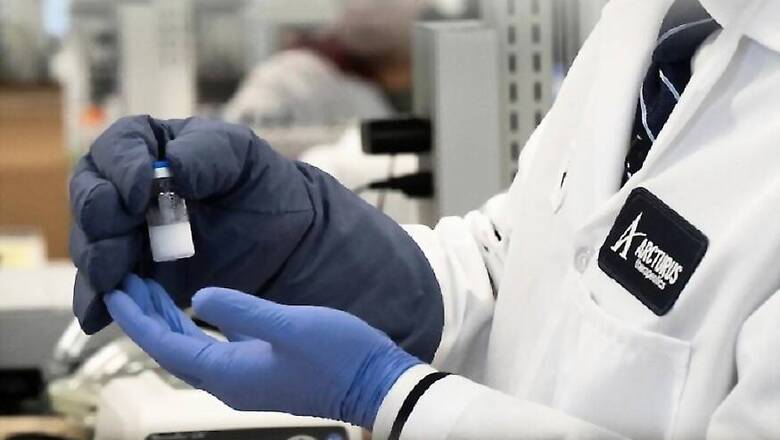
views
With countries struggling to contain the Covid-19 epidemic, drug companies are working round the clock to find a possible vaccine for the novel coronavirus. Across the world, over 140 experimental drug treatment and vaccines for coronavirus are in the development stage, including 11 that are already in clinical trials, The Wall Street Journal (WSJ) reported.
Taking into account drugs which have been approved for treating other diseases, there are presently 254 clinical trials assessing treatments and vaccines, the report said. Most of these are led by universities and government research agencies with over a hundred more trials in the offing. Researchers are crunching timelines for developing these vaccines into weeks and even days, the report added.
“We have never gone so fast with so many resources in such a short time frame,” Paul Stoffels, chief scientific officer of Johnson & Johnson was quoted as saying by WSJ.
However, for most treatments and vaccines, the results of their safety and effectiveness will be known only by mid-summer. J&J, the report says, is eagerly looking forward to a possible vaccine, but won’t be able to start testing it in humans till September. Despite tremendous progress being made, outpacing the virus seems like an impossible task.
US health officials are cautioning the public to gear up for a spurt in infections this week. In the US, Covid-19 has claimed the lives of over 10,000 people. The White House projections also portray a grim scenario with an estimated 100,000 to 240,000 deaths from Covid-19, the report said.
Vaccines to fend off infections and drugs to treat them, it appears, can’t come any sooner. Bereft of these, health officials have had to depend on containment steps, including travel bans and social distancing, the report said.
Vaccines or a new drug usually take years to develop. After identifying prospects, researchers must then make adjustments to maximise their disease-fighting strength and minimise the risk of unwarranted side effects.
“The compounds must be tested in the lab, in animals and extensively in humans. If they succeed, more time is needed to manufacture large numbers of doses,” the report said.
The pressing, high-speed quest is moving along three crucial fronts, the report adds. One is to develop a vaccine that could give immunity, permitting a return to normalcy.
The vaccine that has made the maximum progress is the one in the making by government researchers and Moderna Inc., a biotechnology firm in Cambridge, Mass. The safety test for this vaccine has already commenced. If this, and all subsequent clinical studies pan out, the vaccine could be fit for use by early next year, researchers told WSJ.
Besides this, Inovio Pharmaceuticals Inc. of Plymouth Meeting, Pa. announced that human trials are beginning today for an experimental vaccine it is working on, the report said. Chinese firm CanSino Biologics Inc. and a research arm of the Chinese military have commenced testing of a possible vaccine, as per World Health Organization (WHO). Meanwhile, in Europe, German company CureVac AG and the University of Oxford are developing vaccines, the report said.
Scientists are also studying if existing drugs such as hydroxychloroquine for malaria or HIV treatments might be effective against the novel coronavirus and a few doctors are already treating patients with hydroxychloroquine. The outcome of Chinese studies by Gilead Sciences Inc. on antiviral remdesivir – which was previously tested in Ebola – is also expected this month, the report said.
On the third front, researchers are keeping an eye out for entirely new drugs. These attempts, which take longer than other routes, are programmes to “mine the blood of recovered patients” for antibodies that can be turned into drugs.
Research for finding a vaccine and treatment is challenging, but fighting a virus is a particularly daunting task. Tweaking the immune system, as a few drugs and vaccines focusing on infectious diseases seek to do, risks the possibility of sending the immune response into an overdrive,” the report said.
Several medical facilities across the US are looking for people to test the safety of the potential coronavirus drugs or vaccines. To speed up the process, they are suspending trials of other medicines and allocating data-entry workers, pharmacists and other staff to help with the paperwork, the report said.
It can take researchers many attempts to find more powerful agents. “I think we can find something that, at least, helps people out,” said Derek Lowe, a veteran drug researcher told WSJ.
“Whether any of these things work well enough to get people out of their houses, that’s another question. Maybe it works well enough to reduce the number of people who go on ventilators,” he added.
Several medical facilities across the US are looking for people to test the safety of the potential coronavirus drugs or vaccines. To speed up the process, they are suspending trials of other medicines and allocating data-entry workers, pharmacists and other staff to help with the paperwork, the report said.




















Comments
0 comment